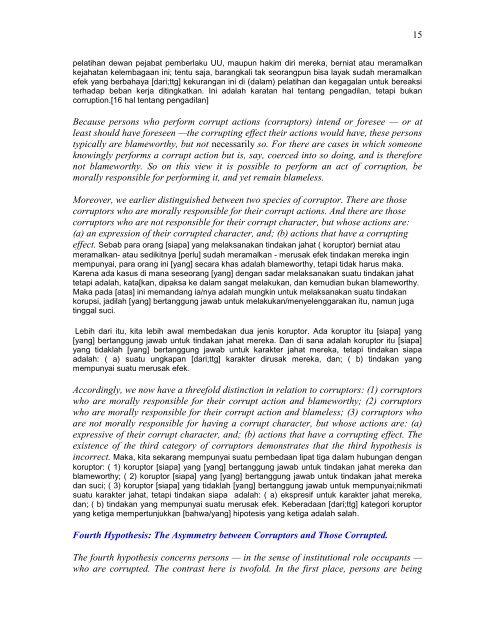FILSAFAT KORUPSI - Direktori File UPI
FILSAFAT KORUPSI - Direktori File UPI
FILSAFAT KORUPSI - Direktori File UPI
Create successful ePaper yourself
Turn your PDF publications into a flip-book with our unique Google optimized e-Paper software.
pelatihan dewan pejabat pemberlaku UU, maupun hakim diri mereka, berniat atau meramalkan<br />
kejahatan kelembagaan ini; tentu saja, barangkali tak seorangpun bisa layak sudah meramalkan<br />
efek yang berbahaya [dari;ttg] kekurangan ini di (dalam) pelatihan dan kegagalan untuk bereaksi<br />
terhadap beban kerja ditingkatkan. Ini adalah karatan hal tentang pengadilan, tetapi bukan<br />
corruption.[16 hal tentang pengadilan]<br />
Because persons who perform corrupt actions (corruptors) intend or foresee — or at<br />
least should have foreseen —the corrupting effect their actions would have, these persons<br />
typically are blameworthy, but not necessarily so. For there are cases in which someone<br />
knowingly performs a corrupt action but is, say, coerced into so doing, and is therefore<br />
not blameworthy. So on this view it is possible to perform an act of corruption, be<br />
morally responsible for performing it, and yet remain blameless.<br />
Moreover, we earlier distinguished between two species of corruptor. There are those<br />
corruptors who are morally responsible for their corrupt actions. And there are those<br />
corruptors who are not responsible for their corrupt character, but whose actions are:<br />
(a) an expression of their corrupted character, and; (b) actions that have a corrupting<br />
effect. Sebab para orang [siapa] yang melaksanakan tindakan jahat ( koruptor) berniat atau<br />
meramalkan- atau sedikitnya [perlu] sudah meramalkan - merusak efek tindakan mereka ingin<br />
mempunyai, para orang ini [yang] secara khas adalah blameworthy, tetapi tidak harus maka.<br />
Karena ada kasus di mana seseorang [yang] dengan sadar melaksanakan suatu tindakan jahat<br />
tetapi adalah, kata[kan, dipaksa ke dalam sangat melakukan, dan kemudian bukan blameworthy.<br />
Maka pada [atas] ini memandang ia/nya adalah mungkin untuk melaksanakan suatu tindakan<br />
korupsi, jadilah [yang] bertanggung jawab untuk melakukan/menyelenggarakan itu, namun juga<br />
tinggal suci.<br />
Lebih dari itu, kita lebih awal membedakan dua jenis koruptor. Ada koruptor itu [siapa] yang<br />
[yang] bertanggung jawab untuk tindakan jahat mereka. Dan di sana adalah koruptor itu [siapa]<br />
yang tidaklah [yang] bertanggung jawab untuk karakter jahat mereka, tetapi tindakan siapa<br />
adalah: ( a) suatu ungkapan [dari;ttg] karakter dirusak mereka, dan; ( b) tindakan yang<br />
mempunyai suatu merusak efek.<br />
Accordingly, we now have a threefold distinction in relation to corruptors: (1) corruptors<br />
who are morally responsible for their corrupt action and blameworthy; (2) corruptors<br />
who are morally responsible for their corrupt action and blameless; (3) corruptors who<br />
are not morally responsible for having a corrupt character, but whose actions are: (a)<br />
expressive of their corrupt character, and; (b) actions that have a corrupting effect. The<br />
existence of the third category of corruptors demonstrates that the third hypothesis is<br />
incorrect. Maka, kita sekarang mempunyai suatu pembedaan lipat tiga dalam hubungan dengan<br />
koruptor: ( 1) koruptor [siapa] yang [yang] bertanggung jawab untuk tindakan jahat mereka dan<br />
blameworthy; ( 2) koruptor [siapa] yang [yang] bertanggung jawab untuk tindakan jahat mereka<br />
dan suci; ( 3) koruptor [siapa] yang tidaklah [yang] bertanggung jawab untuk mempunyai;nikmati<br />
suatu karakter jahat, tetapi tindakan siapa adalah: ( a) ekspresif untuk karakter jahat mereka,<br />
dan; ( b) tindakan yang mempunyai suatu merusak efek. Keberadaan [dari;ttg] kategori koruptor<br />
yang ketiga mempertunjukkan [bahwa/yang] hipotesis yang ketiga adalah salah.<br />
Fourth Hypothesis: The Asymmetry between Corruptors and Those Corrupted.<br />
The fourth hypothesis concerns persons — in the sense of institutional role occupants —<br />
who are corrupted. The contrast here is twofold. In the first place, persons are being<br />
15

















